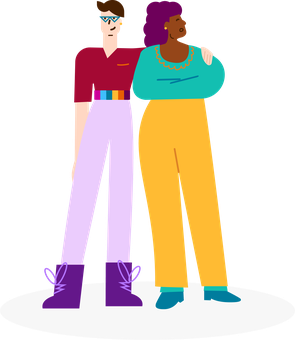Last updated: 19 June 2024
Supporting young trans people in homelessness services
This guidance, co-written with akt provides information on how services can adapt their offer to create safe and welcoming services for young trans people. The guidance will support you and your organisation to reflect and adjust services so they are trans-inclusive, for both young people and staff.
Actions that support staff and managers can take are included, as well as links to additional resources and case studies of organisations working to provide the best service they can for young trans people.
Supporting young trans people experiencing domestic abuse
This briefing, co-written with Loving Me highlights the experiences of abuse faced by young trans people, the possible barriers to services, and outlines the key things homelessness services and practitioners can do to promote inclusion. This briefing was produced through our youth homelessness project, but some of the information will be relevant for people working with adults too.
Top 10 tips for making services more inclusive for trans people
These top 10 tips were developed in partnership with The Outside Project Queer Homelessness Recovery Group, Residents at their shelter (Anira House) and Star Support Refuge. A downloadable 1-page copy is available below.
- Promote and encourage the recruitment of LGBTIQ+ people.
- Use LGBTIQ+ positive signage and flags within services.
- Set up (and pay) a LGBTIQ+ working group, to help develop resources for the service, & review levels of inclusivity.
- Provide training to staff on experiences of trans people & their potential support needs.
- Form partnerships with trans specific healthcare and support services, building staff confidence and knowledge of how to access safe services.
- Have gender-neutral toilets available in all services for non-binary people, with sanitary bins available in all toilets.
- Respect people’s identity and their personal information - staff should not ‘out’ people as trans, or use someone’s birth name instead of their chosen name in any context.
- Consider setting up a free clothing store and clothing alteration group.
- Self-contained/en-suite rooms should be available in supported accommodation for those who are transitioning or have experienced transphobic violence.
- Upskill staff in providing advocacy for trans people, acknowledging that trans people are likely to face multiple, intersectional disadvantages because of structural and systemic prejudice.

